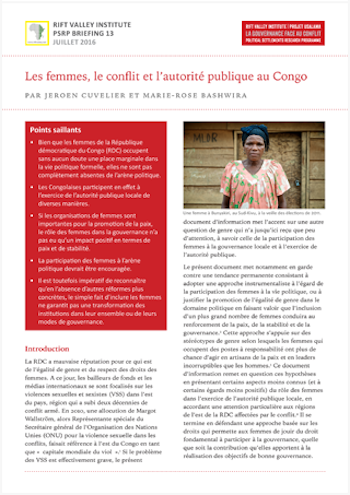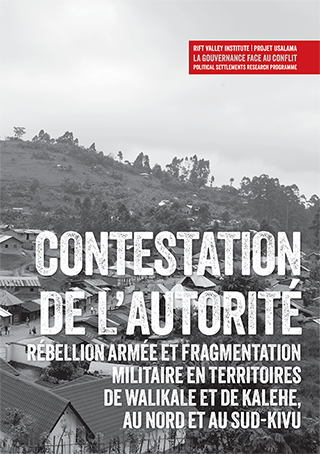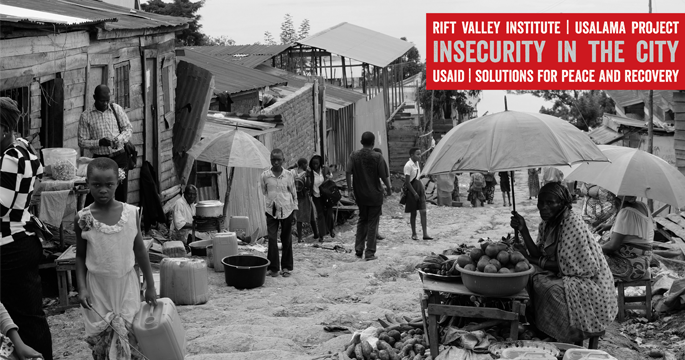A Microcosm of Militarization
This Usalama Report by Judith Verweijen analyses militarization in Uvira and how it shapes the interplay between local conflicts, governance and armed mobilization. Focussing on the Bafuliiru Chiefdom and the Ruzizi Plain Chiefdom, the report examines how armed forces influence and are influenced by conflicts related to customary power, security governance and local economic regulation. […]
Women, Conflict and Public Authority in the Congo
The DRC has a bad reputation when it comes to gender equality and respect for women’s rights. Until now, the donor community and international media have mostly been focusing on sexual and gender-based violence (SGBV) in the eastern part of the country, which has suffered from two decades of armed conflict. In 2010, a speech […]
Les femmes, le conflit et l’autorité publique au Congo

La RDC a mauvaise réputation pour ce qui est de l’égalité de genre et du respect des droits des femmes. A ce jour, les bailleurs de fonds et les médias internationaux se sont focalisés sur les violences sexuelles et sexistes (VSS) dans l’est du pays, région qui a subi deux décennies de conflit armé. En […]
‘It’s not all about the land’
Land disputes are considered both key sources and perpetuating factors of conflict in the eastern Democratic Republic of the Congo (DRC). Over the years, scholars and practitioners have identified a number of critical land-related factors contributing to violence and conflict. These include a considerable diversity of forms of land governance that are fostered by: the […]
Recyclage de rebelles ? La démobilisation au Congo
Pendant la Seconde Guerre du Congo (1998–2003), le gouvernement de la République démocratique du Congo (RDC) et la société civile congolaise ont tenté, avec le soutien de partenaires internationaux, de venir à bout des cycles consécutifs de mobilisation armée. Parmi les différents efforts de paix, l’une des stratégies clés a toujours été celle du désarmement, […]
Stable Instability
After more than two decades of ongoing violent conflict, armed groups—however fleeting their existence—have become an integral feature of the eastern Congo’s social-political order. They are not a temporary aberration in what is otherwise a normal society. They are at the heart of the way power is exercised and experienced. Moreover, armed groups do not […]
Contesting Authority
For more than 20 years, Kalehe and Walikale, two territories connecting the provinces of North and South Kivu, have been characterized by a proliferation of armed groups. The first of these groups emerged during the Masisi war in North Kivu, which pitched autochthonous and migrant communities against each other and affected ethnic cohabitation in Kalehe […]
Contestation de l’autorité

Cela fait plus de vingt ans que les territoires de Kalehe et de Walikale, où se rejoignent les provinces du Nord et du Sud-Kivu, subissent une prolifération de groupes armés. Le premier de ces groupes est apparu pendant la guerre de Masisi, au Nord-Kivu, qui a vu s’opposer des communautés autochtones et migrantes et a affecté […]
Usalama Project

The RVI Usalama Project The eastern Democratic Republic of the Congo has been mired in violence for two decades and continues to be plagued by rampant insecurity. Yet, the drivers of this insecurity remain poorly understood. The Usalama Project is a field-based, partner-driven research initiative that aims to examine dynamics of conflict and violence and […]
« Pas juste une question de terres »
Dans l’est de la République démocratique du Congo (RDC), les litiges fonciers sont considérés à la fois comme une source majeure et un facteur important de conflit. Au fil du temps, les chercheurs et les praticiens ont identifié plusieurs facteurs liés à la terre qui contribuent à la violence et au conflit. Parmi ceux-ci figure […]
